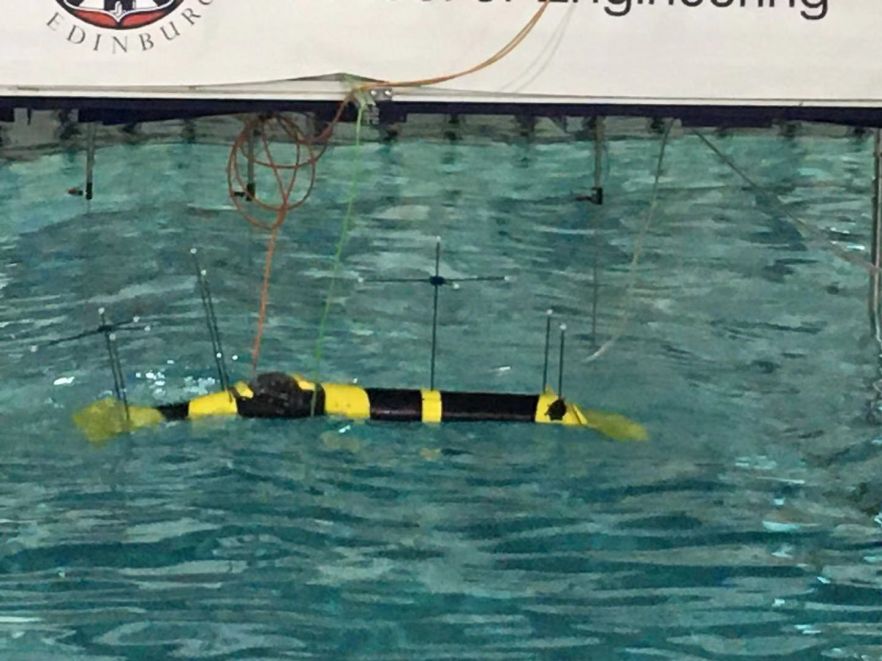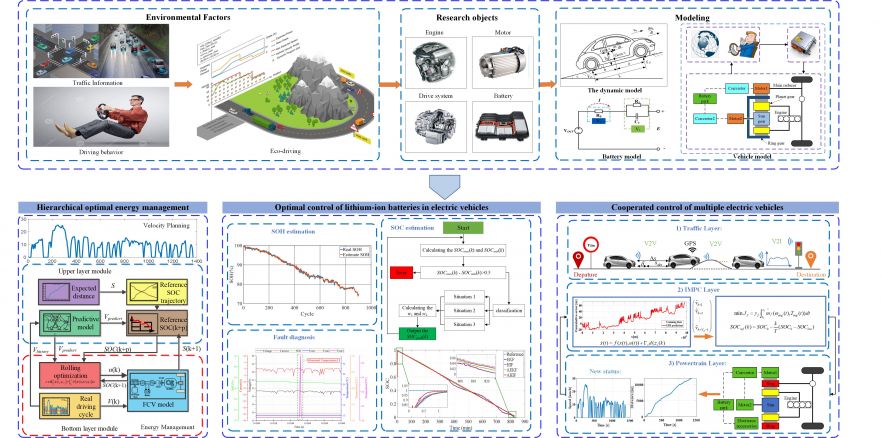Control Systems Group: Projects
Wave Energy Scotland: Adaptive hierarchical model predictive control of wave energy converters -- Stage 3 Project (July 2019- September 2020)
This project aims to experimentally validate the control framework for Wave Energy Converters developed in Stage 2. Hardware-in-the-loop testing and experimental tank testing using FloWave facilities in Edingburgh will be used.
This is one of the 2 projects selected to enter the final Stage 3 Control Programme by Wave Energy Scotland. For more information click here
In March and July, we successfully completed 2 campaigns for wave tank testing experiments using FloWave tank facilities in Edinburgh University. The tank testing results showed that our developed non-causal optimal control algorithms can significantly improve energy output of Mocean's attenuator type of device. The picture below shows the scaled Mocean's WEC physical model during the testing. A wide range of sea conditions were used to test the WEC control performance, including regular waves, irregular waves, side waves and spreading waves. Our optimal controllers can were demonstrated to be very robust and resilient to a wide range of sea conditions.

PI: Dr Guang Li
Partners: Mocean Energy Ltd, University of Exeter.
Project cost (excl. VAT): £461,345.
Hierarchical Optimal Energy Management of Electrical Vehicles (This project has received funding from the European Union’s Horizon 2020 research and innovation programme under grant agreement No. 845102, 2019-2021  )
)
It has been widely recognized that vehicle electrification provides a potential way for the EU to move towards a more decarbonized transport system and sustainable circular economy. The overarching objective of this project is to develop a novel computationally efficient hierarchical adaptive optimal control framework incorporating transportation information and drivers’ habits suitable for energy management of multi-source EVs.
The project has fully achieved its objectives and milestones for the period. The main deliverables included:
1) A novel design method for the multi-level hierarchical energy management strategy of electric vehicles;
2) An investigation with regard to realizing the nonlinear feature of powertrain of electric vehicles;
3) A modified velocity and power demand prediction method, that can be employed in various drive cycles and validated to be effective considering driver’s characterization;
4) An efficient model predictive control strategy, that is tailored for the practical requirements of electric vehicle control problem.
The following figure illustrates the essential research work conducted in this project.

More information can be found from the EU webpage: https://cordis.europa.eu/project/id/845102
PI: Dr Guang Li
Fellow: Dr Zheng Chen
Project cost: Euro 225K.
Control of Launch and Recovery in Enhanced Sea-States - Part of the Launch and Recovery Co-Creation Initiative (EPSRC, Dec 2017 - Nov 2020)
The project aims to develop a novel approach to predicting a suitable time instant at which to initiate an L&R operation, together with a confidence measure (provided as advice to a human operator), and then to control the execution of the subsequent lift operation once initiated, using a novel form of Model Predictive Control. The research overarching vision is to create the new science that can be exploited to provide the underpinnings of a new generation of high added-value products to upgrade the performance and prolong the service life of existing naval vessels.
Currently many marine operations, such as the Launch and Recovery (L&R) from a mother ship of small craft, manned and unmanned air vehicles and submersibles, can only be attempted safely in sufficiently calm sea-states. As an example, the L&R of a small craft from a mothership typically involves the two vessels moving together in proximity (linked by a bow-line) before the main physical connection of the two via a crane/hoist mechanism. In many cases the wave-critical high risk elements of the overall task, i.e. the connection and subsequent hoist of the small craft to the parent vessel, only last for a few tens of seconds. Taking longer than this increases the operation at risk. Once the two craft are physically connected the operator is committed to initiate the hoisting process. In this context even the short term prediction of quiescent periods of vessel motion resulting from lower than average wave activity in otherwise large sea states, has considerable operational value and may allow L&R to be untaken safely in conditions which would currently be deemed unsuitable. Such enhanced L&R capabilities are very attractive to modern navies. In this project the research aim is to develop a novel approach to predicting a suitable time instant at which to initiate an L&R operation, together with a confidence measure (provided as advice to a human operator), and then to control the execution of the subsequent lift operation once initiated, using a novel form of Model Predictive Control (MPC).
The key project deliverables are:
- a prototype decision support system (DSS), running within a software simulator, which provides continuously updated short term predictive simulations over a finite-time horizon of all aspects of the recovery process;
- a controller for the actual physical hoist process.
These two elements will exploit hydrodynamic vessel motion prediction models driven by wave predictions from a Deterministic Sea Wave Prediction (DSWP) system, and historical and real-time vessel motion sensor data. The DSS will initially be engaged as the small craft approaches the mothership and picks up a bow-line (a low risk activity), but is not yet attached to the hoist mechanism. The research will assume the presence on the mothership of a generic winch/crane lifting system with a single cable. The cable tension is a key controlled quantity and the maximum lifting force available is a major system specification parameter. The DSS will: (i) identify an appropriate moment to attach the hoist line and initiate hoisting during predicted quiescent periods; (ii) provide a confidence measure for the safety/success of that specific simulated lift. An appropriate time to attach and hoist will be identified by taking a snap-shot of the current state of both vessels (to use as initial conditions) together with short term predictions of the movement of the mothership to simulate whether it is possible to successfully recover the small craft using the MPC controller. The operator will then be presented with a current advice summary including confidence metrics. If as a result of this advice connection and hoisting is not initiated, the process repeats using a snapshot of the new current data. This cycle continues until the operator decides to engage the hoist (or the recovery is aborted). When connection/hoisting is actually initiated, the physical lifting phase will then employ the same MPC controller used in the simulation, exploiting predictions of the motion of the mothership, the actual real-time measured motions of both craft and a free body model of the small craft when suspended clear of the water.
PI: Dr Guang Li;
PDRA: Dr Yao Zhang.
Project Partners: BAE Systems, James Fisher Defence Ltd, MOD, System Engieneering and Assessment Ltd.
Wave Energy Scotland: Adaptive hierarchical model predictive control of wave energy converters -- Stage 2 Project (April 2018- Dec 2018)
This project aims to fully develop the control framework for Wave Energy Converters proposed in Stage 1 and numerically validate the efficacy by numerical simulations.
This is one of the 3 projects selected to enter Stage 2 Control Programme by Wave Energy Scotland. For more information click here
PI: Dr Guang Li
Partners: Mocean Energy Ltd, University of Exeter.
Project cost (excl. VAT): £151,304.
Control of Floating Wave Energy Converters with Mooring Systems (the Royal Society, Newton Advanced Fellowship, Mar 2017-Feb 2020)
This project aims to resolve a fundamental control problem for floating wave energy converters (WEC) with mooring lines. The project will be collaboratively conducted by the UK team (lead by Dr Li) with expertise in WEC control and the Chinese team (lead by Prof He from University of Science and Technology, Beijing) in mooring control. This fellowship is jointly offered under the Newton Fund and NSFC (China), aiming to "support early career group leaders in partner countries to develop their research by linking them with some of the best research groups in the UK." The project will last for 3 years. The project will be jointly supported by the Royal Society (providing £111K) and NSFC (providing 500K RMB).
PI (the UK host): Dr Guang Li
PI (overseas): Prof Wei He, from University of Science and Technology Beijing, China.
Wave Energy Scotland: Adaptive hierarchical model predictive control of wave energy converters -- Stage 1 Project (Sep 2017- Jan 2018)
This project aims to develop a hierarchical adaptive optimal control framework to maximise wave energy conversion efficiency while guaranteeing safe operation for a large range of sea states. The framework combines the strengths of several key promising technologies in control and wave prediction to adaptively achieve the best trade-off between energy maximisation and survivability.
This is one of the 13 projects selected to work on the control systems project of Wave Energy Scotland. For more information click here
PI: Dr Guang Li
Partners: Mocean Energy Ltd, University of Exeter.
Project cost (excl. VAT): £28,209
Fast adaptive optimal control with application to sustainable energy systems-- Royal Society Newton Mobility Grant (Mar 2016- Feb 2019)
We aim to develop fast adaptive optimal control algorithms for sustainable energy systems. We will mainly focus on adaptive dynamic programming for energy maximisation problem based on the concept of Reinforcement Learning.
PI (the UK side): Dr Guang Li
PI (China): Prof Jing Na (from Kunming University of Science and Technology).

